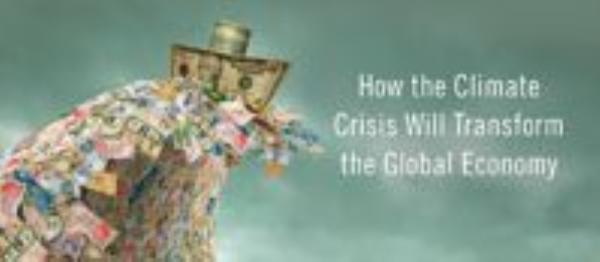Paul Gilding comes across in this eco-book as a serial heretic. He has spent time with Greenpeace, the Australian Army and in successful business consultation, but some of his opinions about the role of business in the fight against climate change one feels would be anathematised briskly by many greens. However, he regards himself as solidly orthodox about climate change in what he takes to be a post-denial world. As a non-scientist he approaches the problem by combining a basic scientific understanding with common sense.
His reader, he assumes reasonably, shares some responsibility for climate change and given the scale of what’s coming, won’t escape its consequences. And everyone, rich and poor, will have to be part of the solution. The contributions of business and industry to the solution will be as essential as they were in the defeat of Nazi Germany and Imperial Japan in World War II, which is his historical paradigm for the possibility of a rapid, international, human response to a clearly-perceived threat.
But will this response happen? Yes, apparently. Gilding begs to differ from the doomsday predictions proffered by such eminences as James Lovelock. He thinks that history shows that humanity can rise to the challenge, once it grasps the nettle of the inevitability of the coming struggle. This will come about, he predicts, when the climate crisis really hammers the world economy. He sees the banking crash of 2008 as a mere curtain-raiser. What would it be like, he asks, if 500 million people lost their livelihoods and one billion their primary source of protein? That will happen in the not unlikely event of world fish stocks crashing. Or consider Gwynne Dyer’s 2030 scenario of an expanding Sahara forcing millions of North African Muslims into post-Christian, secular Southern Europe. Clash of civilisations anyone?
In short we are in for several decades of economic dislocation, political instability and vast migrations, all ultimately the results of a planet over-heated by a politics and economics of limitless growth. However, he is convinced that it is precisely these catastrophes that will galvanise governments and nations into action.
It’s actually not now about ‘saving the planet’, says Gilding: the planet can look after itself and recover in its own immense timescale. Once the economic and social systems start to crash, it will be all about humanity looking to its survival. And yes there will be resource wars and more terrorism and other doltish human responses, but pretty quickly people will realise that these simply waste the time that we have not got to address the real problem. Hence, once it is obvious that the Great Disruption has begun, then there will be a Great Awakening, to the fact that humanity can only handle this problem in solidarity.
He believes, with many scientists, that the technology exists to pull off the required rescue job. His plan resembles what most pundits with a formula for saving the situation suggest – basically that we have to do a lot of things at once, completely transforming the way we live while simultaneously surviving a brutal period of history. This will require sacrifice, ingenuity and a sustained effort. The first stage is a ‘war’ against CO2 emissions to keep the average global increase of temperature below 1 degree Celsius. This is the only safe thing to do to avoid the serious risk of runaway climate change, what Gilding calls ‘falling off the cliff’.
He takes off in rather Teilhardian fashion where he suggests that the common human effort and learning process involved in waging this war will precipitate an evolutionary leap in human moral consciousness. The ‘social contract’ implicit in the growth economy is that one day the poor might become better off, but once growth is history only redistribution will produce the equality which alone produces sustainable social and political stability. Son of a good Methodist family that he is, he even takes a cheeky shot at Jesus himself with a chapter entitled, ‘No, the Poor will not always be with Us’.
Gilding tries to be understanding towards big business, but cannot help effectively saying that there will still be a severe economic judgement for those companies and their shareholders that remain stubbornly blind to the situation. And if any of us don’t yet see the signs of what’s coming, he tells us that actually, ‘the future is here’. Many of the movements and ideas that will drive the necessary change are already approaching critical mass and will use our networked world to explode. The final chapters describe these fascinating movements and their splendid notions, everything from ‘anticonsumers’ in the US to ‘tree-preneurs’ in South Africa. Market indicators also show the way to go. No one is putting serious money into carbon-capture technology for coal-fired power generation apparently, but plenty is going into wind and sun generation.
What occurs to me reading this book during this 50th anniversary of the calling of the Second Vatican Council is that Paul Gilding is pointing to perhaps the most important sign of our present times. He’s also responding to it with what he calls hope. Not optimism, hope which springs from a vision of the human person as fundamentally good and desirous of finding and doing the good. It’s a devastating broadside against materialism and consumerism, but done without the turnoff of heavy, preachy moralising. Gilding in fact proposes an attractive vision of an alternative way of life to the endless acquisition of more and more material things.
But what theological, spiritual and pastoral preparations are Christians, who are supposed to be good at reading the signs of the times, making for this coming disruptive transition? It’s not obvious. Do we have such institutional strengths and leadership to rise to the coming challenge and keep the light of faith and civilisation alive, I wonder? Will we be able to play even a minor positive role in the drama or will we be politely ignored as so often during the AIDS crisis? In short, do we have the capacity and credibility to engage with a modern world which is far less rosy than the one envisaged by Vatican II?
According to Paul Gilding, we won’t have to wait long to find out.
The reviewer, Chris Chatteris SJ teaches at St Francis Xavier Orientation Ceremony in Cape Town.
![]() Find this book on Bloomsbury's web site
Find this book on Bloomsbury's web site
![]() Shop for this book on Amazon, giving a 5% cut to the Jesuit Refugee Service, UK
Shop for this book on Amazon, giving a 5% cut to the Jesuit Refugee Service, UK






